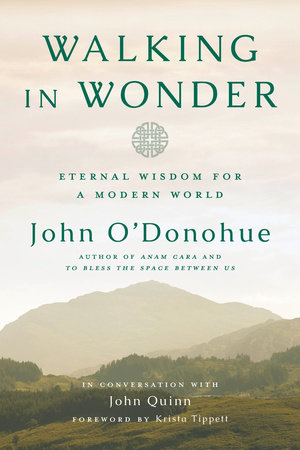Praise for Walking in Wonder
"This marvelous posthumous collection from Irish poet-philosopher O’Donohue (Anam Cara) comes as an unexpected gift for his fans...[his] work remains a rich banquet for those interested in spirituality and his particular expression of contemporary Celtic mysticism." —Publishers Weekly
"This book you now hold in your hands is a treasure." —Krista Tippett, host of On Being
"A celebration of the beauty and mystery of everyday things. Walking in Wonder is a delight." —Deepak Chopra, New York Times bestselling coauthor of You Are the Universe
"This wondrous, panoramic lens of John O'Donohue as mystical theologian, purveyor of the divine imagination, genius of intellect and fierce social-justice activist is a vital gift bestowed by fellow pilgrim and beloved friend John Quinn to a world urgently in need of spiritual replenishment and activism." —Ellen Wingard, coeditor of Enlightened Power: How Women Are Transforming the Practice of Leadership
"John O'Donohue's wondrous words illuminate the pages of this magnificent book as they bring clarity and inspiration to our rapidly changing world. Whether we're discovering John for the first time, or we have already been transformed by the poetry and prose of this profound philosopher, poet, and mystic, Walking in Wonder offers us all a unique opportunity to enter a compelling conversation about the most important yet often hidden challenges of finding meaning and connection in our modern lives." —Daniel J. Siegel, MD, clinical professor at the UCLA School of Medicine and New York Times bestselling author of Aware: The Science and Practice of Presence
"What John O'Donohue could do with words simultaneously baffles, delights and soothes the heart." —Jon Kabat-Zinn, author of Full Catastrophe Living and Falling Awake
"John O'Donohue's contribution as a prophet will continue. His work as a writer and a poet will endure. These conversations between John O'Donohue and John Quinn, maybe Ireland's most thoughtful broadcaster, offer a unique insight into the power of wonder and the importance of symmetry in all aspects of our lives. A powerful contribution." —President of Ireland, Michael D. Higgins
“How glorious it is to hear the voice of John O’Donohue again, the lark-tongued poet, philosopher, theologian and anam cara, who left his imprint on everyone he met. Anyone who spent time with him—in person or in books—came away changed. In this spirited conversation, John is fiercely alive with the electric fizz of being, fully attuned to life, ruminative, and so infused with wonder that every question becomes a lantern. As ever, he delves deeply into the plateaus of being human, and explores the thresholds that arise, frighten, butmust be crossed to become the self one dreams. I so cherish this unexpected gift.” —Diane Ackerman, author of The Zookeeper’s Wife
"As this magnificent book demonstrates, even on the printed page John O’Donohue’s voice—so lyrical and eloquent, so profound and impassioned—flashes vividly to life, beautifully capturing a radiant soul filled with humor, compassion and utter selflessness. Indeed, John not only brilliantly articulated the magic and necessity of joy and gratitude, he ignited a sense of genuine awe in every life he encountered, and he will undoubtedly inspire future generations to learn how to infuse their own lives with meaning and wonder.” —Andrew Carroll, New York Times bestselling author and the cofounder, with the Nobel laureate Joseph Brodsky, of the American Poetry & Literacy Project
“John Quinn’s self-effacing work as editor and broadcaster is rightly renowned. Here he presents, for wider audiences, his absorbing conversations with John O’Donohue’s glorious, far-seeing, far-reaching spirit. Welcome to these luminous encounters!” —Lelia Doolan, Irish activist in various fields
“In these conversations, John Donohue’s timely words feed the deep spiritual hunger that creeps into our hearts as individuals and our nation as a whole. He reframes the human story of fear, aging, death, otherness and absence, reminding us that they are all bound up in the mystery of wonder. O’Donohue lives on as a prophetic and priestly presence for such a time as this.” —Rev. Dr. Katharine Henderson, president of Auburn Seminary
“In each chapter the reader experiences a rich and exhilarating new conversation. We witness a man whose intellect and life force are in full bloom, deeply rooted in spirit, humor, curiosity and compassion. John invites us to pause and reflect, challenging us to reach beyondour well-trod and comfortable assumptions.” —Richard Harrell, musician and educator at the Juilliard School, San Francisco Conservatory, and Orfeo Foundation
“Luminous! Walking in Wonder shines light on life’s dark mysteries and offers sustenance for spiritual hunger. As you confront the inevitable thresholds of loss, absence and aging, this book will serve as a road map to help you navigate with grace, gratitude and a fearless heart. John O’Donohue’s elegant words are a call to live with abundance, to look inward with courage and to look outward with compassion. They are a reminder to embrace the wild energy of your soul.” —Gina Vild, coauthor of The Two Most Important Days: How to Find Your Purpose—and Live a Happier, Healthier Life
“John O’Donohue’s insights in this new collection offer a glimpse into the wonder and presence of knowing him. His signature themes rooted in Celtic spirituality and contemplative exploration offer bread crumbs on the path, encouraging us to embrace the beauty and gift of each day.” —Davy Spillane, Grammy Award–winning musician and composer at North Atlantic Music, Ireland
“This volume is a testament to the timelessness of John O’Donohue’s wisdom. His words are not only inspirational to those of us catalyzing substantive social change but compel us to consider how we nurture, support and thrive amidst chaos.” —Rev. Diane J. Johnson, PhD, national interfaith and social justice activist, and founder and president of Mmapeu Management Consulting




